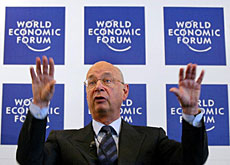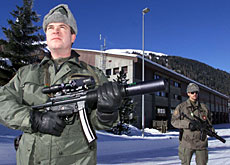WEF opponents can’t agree to disagree

Unlike in previous years, opponents of the World Economic Forum (WEF) will not be presenting a united front when the annual meeting opens in Davos this week.
Criticism of the gathering remains as intense as ever, but protest groups are struggling to find common ground.
On the face of it, it would appear that the WEF has scored a victory against its opponents: the vast meeting in the ski resort of Davos will this year not be accompanied by the usual organised demonstrations.
The unexpected calm has come about because the organisation in charge of uniting the various opposition groups, the Olten Alliance, has failed to do so this year.
Organisations ranging from trade unions and socialist groups to non-governmental organisations and anarchists could not agree on a common plan of action. Violence was one of the most divisive issues.
Geneva sociologist Jean Rossiaud believes the disunity among protesters is indicative of a wider rift between most anti-globalisation organisations, which are increasingly pacifist, and smaller extremist groups bent on causing destruction.
“The [anti-globalisation] movement is tending more and more towards non-violence, transparency and democratic representation,” Rossiaud told swissinfo. “But the direct action favoured by small extremist groups is neither transparent nor democratic.”
His view is shared by Jürg Bühler, an expert in analysis and prevention at the Federal Police Office.
“We are monitoring only splinter movements and individuals which come together under the [Swiss group] Revolutionary Alliance against the WEF. These are mostly inclined towards violence,” Bühler told swissinfo.
“The rest of the anti-globalisation movement does not pose a problem for us.”
Talking not chanting
The effect of this split in the anti-globalisation movement has led to protesters turning increasingly to forums rather than the streets to express their opposition to the WEF.
But even here, opinions differ markedly. The Open Forum Davos, set up by the NGO, Bread for All, favours dialogue with the WEF.
The Public Eye on Davos – launched by Berne Declaration – takes a different approach, holding parallel events which give a platform to developing countries.
While, over in Zurich, Attac Switzerland brings together leftwing groups at a gathering called The Other Davos.
“It’s not new to have different opinions represented in different gatherings,” said Attac spokesman Alessandro Pelizzari. “That’s been the case since the movement first started.”
Reformist vs radical
But some sociologists believe there could be a definitive split between the two branches of the anti-globalisation movement, with one favouring a reformist approach and the other demanding a radical overhaul of the capitalist system.
In Mumbai, the divisions between the two camps are plain to see as two different anti-globalisation forums get underway in the Indian city: the World Social Forum (WSF) and the “Mumbai Resistance”.
But Rossiaud thinks this ideological split, which is as old as the history of the workers’ movement, is now outdated.
“There is a third voice that has managed to be heard, and that’s thanks to the environmental organisations.”
“The majority of anti-globalisation organisations believe that the economic and political structures of our society have to change,” Rossiaud added.
“However, the way this goal is achieved is no longer by replacing a political-economic system with another one, but by changing the existing system step by step.”
swissinfo, Frédéric Burnand in Geneva
1999: The first anti-globalisation demonstration takes place in Davos.
2000: The World Social Forum (WSF) is launched in Geneva; in 2001 the WSF takes place in Porto Alegre, Brazil.
2001: Massive demonstrations take place in Genoa during the G-8 summit. The first anti-globalisation protester is killed.
2002: First European Social Forum kicks off in Florence.
2003: More than 10,000 people demonstrate against the G-8 summit in Evian, France. Protesters clash with riot police in Geneva and Lausanne.
2004: Globalisation opponents show little interest in an anti-globalisation demonstration in Davos.

In compliance with the JTI standards
More: SWI swissinfo.ch certified by the Journalism Trust Initiative













You can find an overview of ongoing debates with our journalists here . Please join us!
If you want to start a conversation about a topic raised in this article or want to report factual errors, email us at english@swissinfo.ch.